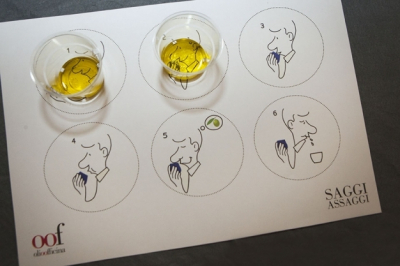Training courses in the oil sector
Why is it that undergraduate master’s degrees in olive tree cultivation and oil-making techniques have very little success, and never evolve to more advanced degrees? Why is it that no attempt is made to change vocational education and bring a breath of fresh air to a sector now at a standstill? And what about the role of the oil specialist? Where can one acquire blending skills? There are no specific courses for future blenders. And even the schools for professional tasters have great limitations

Vocational training was one of the topics discussed at the last Olio Officina Festival. It is an extremely important issue, because proper attention to education could arguably bring great benefits to the olive tree cultivation and oil production sectors.
Two are the fundamental questions requiring an answer: why is it that undergraduate master’s degrees in olive tree cultivation and oil-making techniques have very little success, and never evolve to more advanced degrees? Why are so few people interested in acquiring a vocational education that would certainly bring a breath of fresh air to a sector now at a standstill?
Proper training is a necessity. However, whereas in the past there used to be quite a number of master’s degrees in olive tree cultivation, nowadays, notes Lanfranco Conte, Professor of Food Chemistry at the University of Udine, there are only random ventures, such as the courses organized by the National Academy of Olives and Oil. Organizing a master’s degree course, in this as in any other subject, is far from simple, especially considering how hard it is to find the necessary funds to set it up, and its uncertain outcome, job-wise.
How can one become a qualified oleologist or oil-specialist with a proper vocational background, like an oenologist in the wine sector? The problem, argues Prof. Conte, is also that the olive mills, most of which are small and with limited resources, find it hard to hire full-time a professional such as an oil specialist, although they could certainly join together to share the expense.
 From the left: Luigi Caricato, Lanfranco Conte and Lorenzo Cerretani
From the left: Luigi Caricato, Lanfranco Conte and Lorenzo Cerretani
The oleologist: a consultant needed only for short periods of time
It should be noted however that unlike oenologists, oil specialists or oleologists are needed for short periods of time. As well as the scale of the enterprise (in Italy, olive mills are generally 10-20 times smaller than their Spanish counterparts), the problem is the seasonality of the work, remarks oleologist Lorenzo Cerretani. Suffice it to say that while the olive-harvesting and oil-making season used to last 3-4 months, now it barely lasts a month and a half, and this is one of the reasons why the importance of a professional such as the oil specialist is not duly appreciated, or better, only for short periods of time.
Mr. Cerretani remembers taking part in the first (and probably only) undergraduate master’s degree in production, processing and marketing of olive oil, organized by the University of Teramo. Although it was well structured, and offered an in-depth analysis of many topics, from agronomy to sensory analysis, none of the participants found a full-time job in the olive oil sector after their degree.
It is a vicious circle: the companies fail to appreciate the usefulness of oil-specialists, and are therefore little inclined to fund these courses.
Yet, as Luigi Caricato observes, there are also a few who understand how useful training courses can be, and have decided to take matters into their own hands.
Pasquale Manca, for instance, CEO of Olio San Giuliano, a renowned olive farm and mill in Alghero, is opening an “oil school”, with the aim of expanding the consumers’ knowledge of the subject. The lessons will focus less on the technical aspects of oil, and more on its benefits and virtues.
 From the left: Lanfranco Conte and Lorenzo Cerretani
From the left: Lanfranco Conte and Lorenzo Cerretani
Starting “blending” courses
Another aspect that should be taken into account is that small-scale companies often find it difficult to produce a satisfactory blend of oils obtained from different varieties of olives. Blending requires great skill and technical know-how, but sadly, currently there are no courses or vocational schools for master blenders. Most courses focus on tasting, teaching the students to identify the sensory profile of oil and appreciate its qualities. The art of blending however, i.e. the making of an oil that will satisfy the producer’s requirements, is something completely different.
The consequence, as Mr. Cerretani observes, is that despite the importance of blending, much is left to improvisation, and it is easy to see how better things would be if this stage were taken care of by a professional with a master’s degree. At present however, the only courses available are those focusing on oil-tasting, but as mentioned previously, sensory analysis is not the only factor required to make a good blend.
Moreover, in Professor Conte’s opinion, sensory analysis courses are far from being perfect. The lessons focus almost exclusively on the faults of oil, and fail to highlight its more positive traits. This type of approach is certainly misleading. Yet these courses have great success with the general public, and when they are targeted at children, we cannot help noticing their extraordinary receptiveness. Their senses are still undulled, and they are completely free of mental superstructures. Tasting sessions in junior schools should therefore be endorsed: we might be able to form a generation of more sensitive consumers, and the oil manufacturers would have to respond accordingly.
Highlighting the virtues as well as the faults
At the end of the debate, Luigi Caricato confirmed that many courses are rather short-sighted and have the sole aim of creating professional tasters or panel chairmen. Furthermore, despite their usefulness, these courses have often been incapable of losing their focus on defects. This type of vision was doubtlessly useful in the past, when the raw material was often faulty, but now we can rely on more sophisticated technology and a greater sensitivity towards this issue. Keeping the focus on the defects means creating a distorted view that inevitably affects the way one approaches oil-tasting sessions.
In this respect, it is interesting to draw a parallel with the world of wine and AIS, the Italian Association of Sommeliers. AIS was established with the intent of explaining the features of wine in simple terms, so as to make oenology more accessible to the general public. This association now has over 35 thousand members, a number far from that of all the students of oil-tasting courses put together.
What should we do then, what is the best way out of this impasse? First of all, Mr. Caricato suggests, we should revolutionise tasting courses, so as to lose this negative focus, and in order to do so, the first step is to train new teachers. The second step is to learn to talk about oil. The language used in guides and reports is full of hazy expressions that have little in common with the simple, direct language we use today. This perhaps could be the starting point: by revising and updating our language, we could make teaching and schooling more effective. At every level.
To comment you have to register
If you're already registered you can click here to access your account
or click here to create a new account


Comment this news